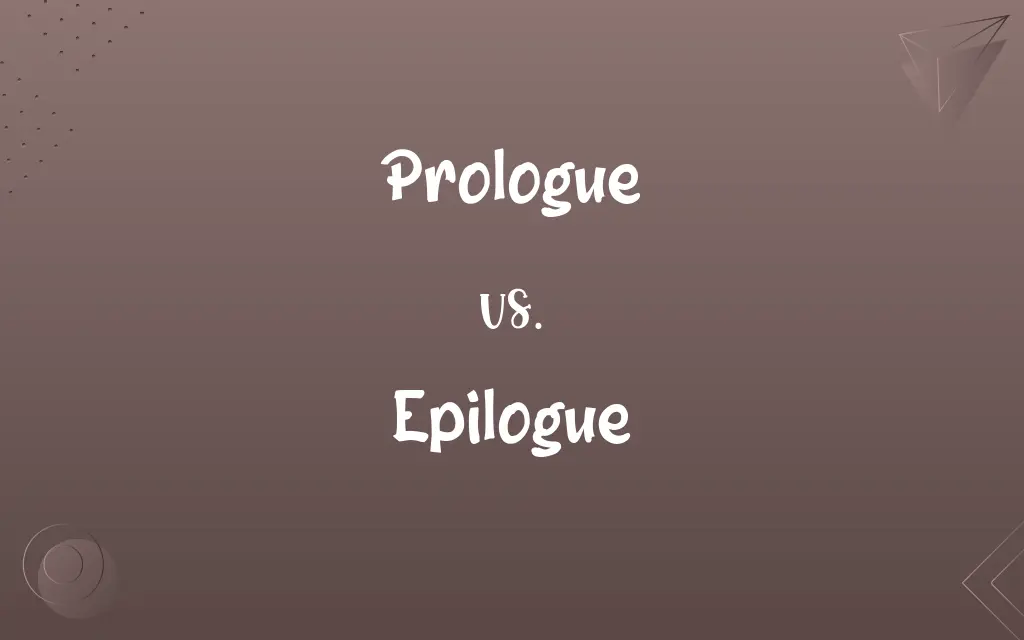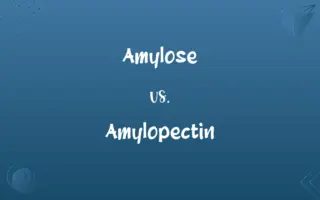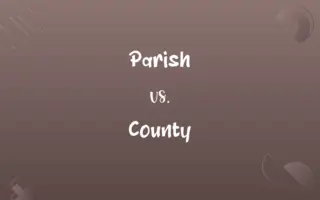Prologue vs. Epilogue: Know the Difference

By Shumaila Saeed || Updated on December 25, 2023
A prologue is an introductory section of a literary work, setting the scene or background, while an epilogue is a concluding section that wraps up or extends the story.

Key Differences
The Prologue often serves as a gateway into the story, providing context, background information, or setting the tone for what is to come. In contrast, the Epilogue comes after the main narrative has concluded, offering a glimpse into the future of the characters or summarizing the story's outcome.
Shumaila Saeed
Dec 23, 2023
A Prologue can be used to introduce characters, establish a setting, or present a conflict that drives the narrative. Meanwhile, an Epilogue typically reflects on the events of the main story, providing closure or offering additional insight into the characters' lives post-story.
Shumaila Saeed
Dec 23, 2023
In terms of structure, the Prologue is positioned at the very beginning of a book or play, acting as a prelude to the main story. The Epilogue, on the other hand, is found at the end, often after the climax and resolution, serving as a final comment or conclusion.
Shumaila Saeed
Dec 23, 2023
The narrative voice in a Prologue can be that of a character, the author, or an omniscient narrator, setting up expectations or themes. The Epilogue might maintain the same narrative style as the main story or shift perspective, providing a different viewpoint on the events that unfolded.
Shumaila Saeed
Dec 23, 2023
While a Prologue is used to engage the reader and provide key information or foreshadowing, an Epilogue is not always necessary but can be used to tie up loose ends, answer unresolved questions, or set up a sequel.
Shumaila Saeed
Dec 23, 2023
ADVERTISEMENT
Comparison Chart
Purpose
Introduce background, setting, or context
Provide closure, reflect on story's end
Shumaila Saeed
Dec 23, 2023
Narrative Content
Often background or foreshadowing
Reflection, future outlook, or conclusion
Shumaila Saeed
Dec 23, 2023
ADVERTISEMENT
Prologue and Epilogue Definitions
Prologue
A prologue is an opening section of a story, providing background or context.
The prologue set the scene for a medieval adventure, describing the ancient kingdom.
Shumaila Saeed
Dec 15, 2023
Epilogue
An epilogue can provide closure or tie up loose ends of the story.
The epilogue answered lingering questions about the protagonist's fate.
Shumaila Saeed
Dec 15, 2023
Prologue
A prologue is often a standalone section, separate from the main chapters.
The prologue featured a dramatic event that piqued the reader's interest.
Shumaila Saeed
Dec 15, 2023
Epilogue
An epilogue often reflects on the outcome or lessons of the story.
The epilogue offered a reflective commentary on the events that had transpired.
Shumaila Saeed
Dec 15, 2023
Prologue
A prologue introduces themes or foreshadows events of the main narrative.
The prologue hinted at a mystery that would unfold throughout the novel.
Shumaila Saeed
Dec 15, 2023
ADVERTISEMENT
Epilogue
An epilogue adds depth or a final twist to the story.
The epilogue provided a surprising twist that changed the reader's understanding of the plot.
Shumaila Saeed
Dec 15, 2023
Prologue
A prologue can offer a backstory or a different perspective from the main story.
In the prologue, the narrator recounted events from a century before the story's main events.
Shumaila Saeed
Dec 15, 2023
Epilogue
An epilogue can set the stage for a sequel or a new narrative.
The epilogue introduced a new character, hinting at a possible sequel.
Shumaila Saeed
Dec 15, 2023
Prologue
An introduction or preface, especially a poem recited to introduce a play.
Shumaila Saeed
Dec 13, 2023
Epilogue
A short poem or speech spoken directly to the audience following the conclusion of a play.
Shumaila Saeed
Dec 13, 2023
Epilogue
A short addition or concluding section at the end of a literary work, often dealing with the future of its characters. Also called afterword.
Shumaila Saeed
Dec 13, 2023
Prologue
A speech or section used as an introduction, especially to a play or novel.
Shumaila Saeed
Dec 13, 2023
Epilogue
An event which reflects meaningfully on a recently ended conflict or struggle.
Shumaila Saeed
Dec 13, 2023
Epilogue
A short speech, spoken directly at the audience at the end of a play
Shumaila Saeed
Dec 13, 2023
Prologue
(computing) A component of a computer program that prepares the computer to execute a routine.
Shumaila Saeed
Dec 13, 2023
Prologue
(cycling) An individual time trial before a stage race, used to determine which rider wears the leader's jersey on the first stage.
Shumaila Saeed
Dec 13, 2023
Epilogue
A brief oration or script at the end of a literary piece; an afterword
Shumaila Saeed
Dec 13, 2023
Epilogue
(computing) A component of a computer program that prepares the computer to return from a routine.
Shumaila Saeed
Dec 13, 2023
Prologue
The preface or introduction to a discourse, poem, or performance; as, the prologue of Chaucer's "Canterbury Tales;" esp., a discourse or poem spoken before a dramatic performance
Shumaila Saeed
Dec 13, 2023
Epilogue
A speech or short poem addressed to the spectators and recited by one of the actors, after the conclusion of the play.
A good play no epilogue, yet . . . good plays prove the better by the help of good epilogues.
Shumaila Saeed
Dec 13, 2023
Epilogue
The closing part of a discourse, in which the principal matters are recapitulated; a conclusion.
Shumaila Saeed
Dec 13, 2023
Epilogue
A short speech (often in verse) addressed directly to the audience by an actor at the end of a play
Shumaila Saeed
Dec 13, 2023
Prologue
A prologue can be used to create intrigue or set a tone for the story.
The dark and stormy prologue created an eerie atmosphere for the horror novel.
Shumaila Saeed
Dec 15, 2023
Epilogue
A short passage added at the end of a literary work;
The epilogue told what eventually happened to the main characters
Shumaila Saeed
Dec 13, 2023
Epilogue
An epilogue is a concluding section that follows the main narrative.
The epilogue revealed what happened to the characters years after the story ended.
Shumaila Saeed
Dec 15, 2023
Repeatedly Asked Queries
Can an epilogue be used in non-fiction works?
Yes, epilogues can be used in non-fiction to summarize findings or discuss future implications.
Shumaila Saeed
Dec 23, 2023
Should a prologue be read before the main story?
Yes, a prologue is intended to be read first as it often contains important information or context.
Shumaila Saeed
Dec 23, 2023
Is the narrative style of a prologue different from the main story?
The narrative style of a prologue can be different, often setting a unique tone or perspective.
Shumaila Saeed
Dec 23, 2023
Can a prologue contain a different timeline than the main story?
Yes, prologues often contain events from a different time to provide context or background.
Shumaila Saeed
Dec 23, 2023
Can an epilogue change the reader's perspective on the story?
Yes, an epilogue can offer new insights or revelations that change the understanding of the story.
Shumaila Saeed
Dec 23, 2023
Is an epilogue always the last part of a book?
Typically, yes, an epilogue is the final section, providing closure after the main narrative.
Shumaila Saeed
Dec 23, 2023
Can a prologue be written from a different character’s perspective?
Yes, a prologue can offer a unique perspective, including that of a different character.
Shumaila Saeed
Dec 23, 2023
Do all stories require an epilogue?
No, an epilogue is optional and depends on whether additional closure or information is needed.
Shumaila Saeed
Dec 23, 2023
Should an epilogue resolve all unanswered questions from the story?
While an epilogue often resolves unanswered questions, it may also intentionally leave some aspects open.
Shumaila Saeed
Dec 23, 2023
Is a prologue necessary in a novel?
A prologue is not always necessary but can be useful for setting the scene or providing background.
Shumaila Saeed
Dec 23, 2023
How do authors use prologues effectively?
Effective prologues engage the reader, provide important information, and set the tone for the story.
Shumaila Saeed
Dec 23, 2023
Can an epilogue hint at a potential sequel?
Yes, epilogues can be used to hint at or set up a sequel.
Shumaila Saeed
Dec 23, 2023
How long should a prologue or epilogue be?
The length varies but they are generally shorter than the average chapters in the main story.
Shumaila Saeed
Dec 23, 2023
Is it common to have both a prologue and an epilogue in the same work?
It's not uncommon, but whether both are used depends on the author's narrative needs.
Shumaila Saeed
Dec 23, 2023
How do epilogues contribute to character development?
Epilogues can show the long-term effects of the story on characters, further developing their arcs.
Shumaila Saeed
Dec 23, 2023
Can a prologue be written after completing the main story?
Yes, authors sometimes write the prologue after the main story to ensure it aligns with the narrative.
Shumaila Saeed
Dec 23, 2023
Can a prologue be a flashback?
Yes, a prologue can be a flashback that provides relevant backstory or context.
Shumaila Saeed
Dec 23, 2023
How do prologues and epilogues differ in non-linear narratives?
In non-linear narratives, prologues and epilogues may play with time and perspective more fluidly, often enhancing the unconventional structure of the story.
Shumaila Saeed
Dec 23, 2023
What types of information are typically included in an epilogue?
Epilogues often include future events, character resolutions, or reflections on the story.
Shumaila Saeed
Dec 23, 2023
Can a prologue be skipped by the reader?
It's not recommended to skip the prologue as it may contain key elements relevant to the story.
Shumaila Saeed
Dec 23, 2023
Share this page
Link for your blog / website
HTML
Link to share via messenger
About Author
Written by
Shumaila SaeedShumaila Saeed, an expert content creator with 6 years of experience, specializes in distilling complex topics into easily digestible comparisons, shining a light on the nuances that both inform and educate readers with clarity and accuracy.








































































